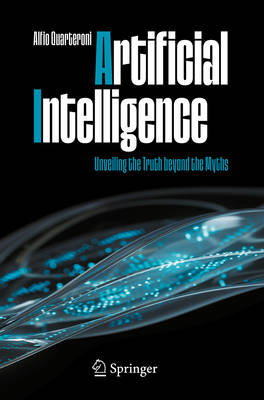
- Afhalen na 1 uur in een winkel met voorraad
- Gratis thuislevering in België vanaf € 30
- Ruim aanbod met 7 miljoen producten
- Afhalen na 1 uur in een winkel met voorraad
- Gratis thuislevering in België vanaf € 30
- Ruim aanbod met 7 miljoen producten
Zoeken
Omschrijving
Artificial intelligence (AI) is transforming multiple aspects of human life, raising fundamental questions: Is AI truly intelligent? Can it surpass human capabilities? What are its risks and opportunities? In this book, I aim to clarify what AI really is, debunking myths while offering a rigorous, balanced perspective on its impact. Rather than chasing the latest AI trends, I will focus on the core principles that define it, tracing its evolution from early pioneers like Alan Turing to today's advanced systems. AI remains in the realm of narrow intelligence, excelling at specific tasks but far from replicating human cognition. Yet, its ability to process vast data, predict behaviors, and generate creative content is reshaping industries, from healthcare to finance. At the heart of AI's progress is machine learning, particularly neural networks, which rely more on data-driven training than traditional scientific theory. However, this innovation comes with challenges: environmental costs, job market disruptions, ethical dilemmas, and the black box problem--AI's decision-making opacity, which raises concerns about trust and accountability. AI also plays a growing role in global power dynamics, influencing governance, security, and even democracy. Nations leading AI development gain strategic advantages, but without careful regulation, AI could fuel inequality, surveillance, and manipulation. Despite the fears AI evokes, it is neither an existential threat nor a magical solution. My goal is not to celebrate or demonize it but to provide a critical framework for understanding this technological revolution. By fostering awareness, we can shape AI's integration into society in a way that aligns with human values and scientific progress.
Specificaties
Betrokkenen
- Auteur(s):
- Uitgeverij:
Inhoud
- Aantal bladzijden:
- 159
- Taal:
- Engels
- Reeks:
Eigenschappen
- Productcode (EAN):
- 9783031929724
- Verschijningsdatum:
- 21/07/2025
- Uitvoering:
- Paperback
- Formaat:
- Trade paperback (VS)
- Afmetingen:
- 156 mm x 234 mm
- Gewicht:
- 254 g

Alleen bij Standaard Boekhandel
+ 91 punten op je klantenkaart van Standaard Boekhandel
Beoordelingen
We publiceren alleen reviews die voldoen aan de voorwaarden voor reviews. Bekijk onze voorwaarden voor reviews.







